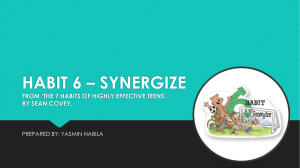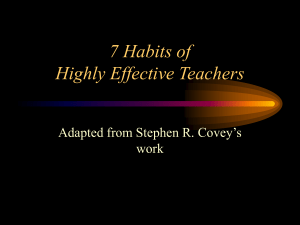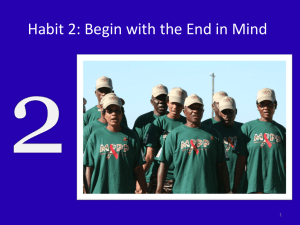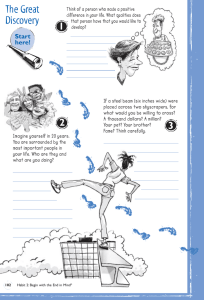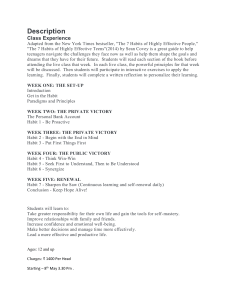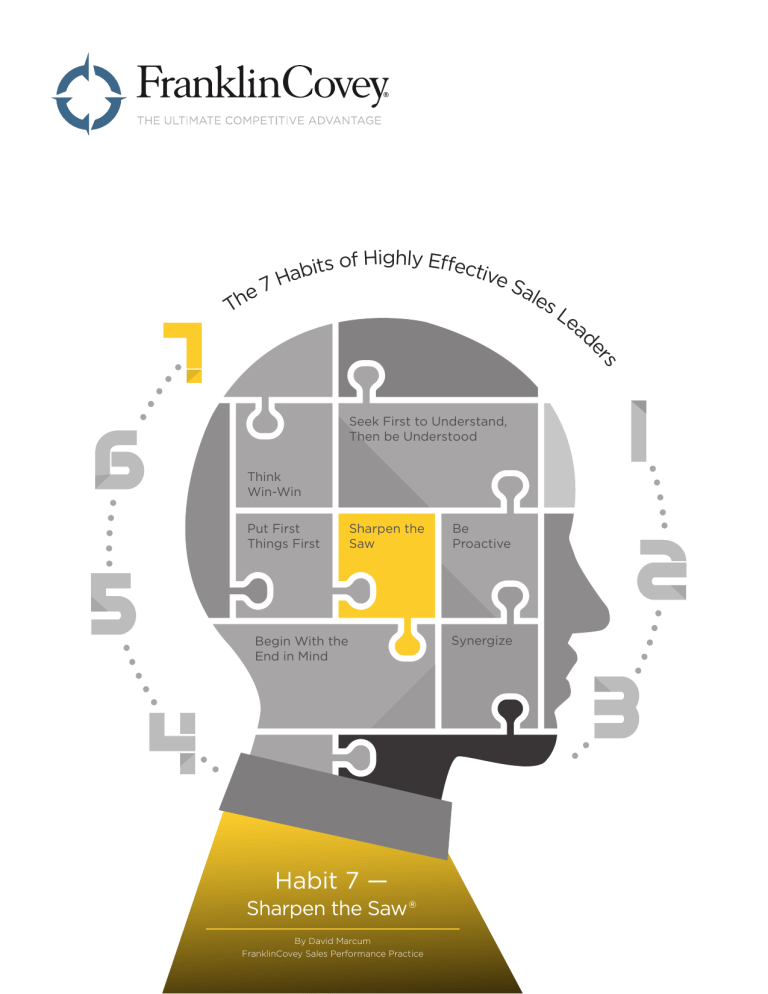
of Highly Effect s t i b ive Ha Sa 7 e les h T Le ad s er Seek First to Understand, Then be Understood Think Win-Win Put First Things First Sharpen the Saw Begin With the End in Mind Habit 7 — Sharpen the Saw® By David Marcum FranklinCovey Sales Performance Practice Be Proactive Synergize Make a quick mental list of assets you control or own. Perhaps you started with a house, cars, boat, or stocks. As far as assets go, it’s easy to list possessions you bought. But, as you look it over, did YOU make it onto the list? Clearly, your most important asset is you since you produce the other assets on your list. It follows that the best (and most vital) investment you can ever make is in yourself. The final pointof-view article in To continue to produce, you need to feed your ability to produce, just as you need to change the oil in a car and put gas in it. But often, in your pursuit to earn a living you forego investing consistently in ways that increase your capability. Habit 7 tackles the need to “sharpen the saw” in four key areas: 1) physical, 2) mental, 3) social/emotional, and 4) spiritual. Each of these is closely tied and together make up our very beings. Habit 7 is vital because it enables all the other habits. What can you do as a sales leader to encourage focus on Habit 7? Here are a few ideas that will help. a series on the current issues facing sales leaders, based on the principles of Dr. Stephen R. Covey’s The 7 Habits of Highly Effective People®—the groundbreaking bestseller on personal and Are you in? Make no mistake—fitness is in! Gym membership sales are at an all-time high. Over 58 million people pay for a gym membership each year. We buy the right gear and get ready to work out. We go to yoga, Zumba, or Pilates. We do spin classes on stationary bikes, step up to CrossFit training, or train for a half marathon. But even though gyms are happy about membership sales, there are other trends that factor heavily into the fitness story. To say it more accurately, the idea of fitness is in, not actual fitness. Only 18 percent of the population pays for a gym membership. Despite good intentions, 67 percent of people with a gym membership don’t use it. Sixty percent of Americans don’t get the recommended amount of physical activity in a week. That leads to increased obesity rates1, which have doubled in the US from the 15 percent they were thirty years ago. During that same time, obesity rates for children have more than tripled. One study projects that over half of the US population will be considered obese by 2030. organizational change. Obesity is defined as having a body mass index (BMI) above 30. Overweight means a BMI of 25 to 29.9. BMI is calculated by taking your weight in pounds and dividing it by the square of your height in inches, and multiplying the result by 703. For instance, if you are 5 feet, 5 inches tall (65 inches x 65 inches equals 4,225) and you weigh 185 pounds (84 kg) you have a BMI of 30.8. 1 2 ©Franklin Covey Co. All rights reserved. Addicted to Urgent? I love that the first aspect of Habit 7 is physical well-being. Sometimes you’re dedicated and disciplined. At other times, you give in to the easy path and opt out, usually because you don’t feel like it. What is the main reason people don’t feel like exercising? People say they’re too busy, but a closer look tells a different story. With countless priorities vying for attention, you tend to deal with those that are urgent—including those that aren’t important. Without realizing it, you develop an addiction to urgency, which sidelines exercise because renewal is anything but urgent. When you get in a rut, exercise is a game changer. It’s easy to do and fully within your control. Exercise has other benefits as well. Scientific research shows that exercise strengthens the brain and is essential to mental capacity. Plus, a consistent exercise routine affects other areas of your life—for example, when you work out you tend to eat better. Surprisingly, it can even lead to better financial discipline by giving you the stamina to curb spending. As a sales leader, do you encourage exercise or physical activity? Lead by example as a more powerful way to show fitness matters. Ask your company to pay for gym memberships as part of the wellness program. Allow scheduling flexibility so your team uses that membership, even during the day. Research shows people are more disciplined for longer periods and work out more intensely if they have a workout partner. Perhaps you could encourage workout partnerships. This could also build harmony in the team. What can you do on the healthy-eating side that would make a difference? Choose different snacks for meetings. Suggest different foods be included in the cafeteria or vending machines. Get a nutritionist to coach members of your team who want help building a nutrition plan. Pay attention to energy management. Schedule heavier meetings in the mornings when energy is high rather than later in the day. 3 th e S Sa har w pe n The Invisible Muscle A decision to start eating better and get in shape is easy. It’s also easier than we like to admit to see our resolve fade. The problem isn’t the gyms, equipment, trainers, or goals we set. It’s that plus factor that Habit 7 helps you build. To take control of your life requires willpower. According to science, willpower is like a muscle—it gets stronger with exercise. Even though it’s not one of the four dimensions Dr. Covey mentions, taking weekly small steps in each area builds this invisible muscle! Here’s how you can build resolve: make a small, weekly commitment to yourself in each of the four areas of personal renewal. I suggest you start small rather than swing the pendulum too far. It doesn’t require a lot of time to see changes—for example, 15 minutes of aerobic exercise three or four times per week is enough. Get started! Then slowly increase your time. Keeping these small commitments builds self-control and boosts your sense of self-worth. Over time, your willpower is steeled and gives you the power to resist even persistent temptation. S Sa har w pe n th e But the opposite is also true.Your willpower can lessen just as easily. The more you give in to the impulse that whispers in your ear, “I don’t feel like exercising today,” the more your willpower muscle withers. That habit spreads to other areas of your life, and you say, “I don’t feel like doing that either…” Again, over time you slowly lose selfcontrol and give up the very part of you that makes you unique, powerful, and able to accomplish your goals. Once lost, you have to fight hard to get that power back. How’s Your Balance Sheet? Living Habit 7 reminds you to build balance in your life. It’s easy, sometimes for long periods of time, to lose sight of the need for renewal. Some choose to over-focus on one area of life. For example, think of people who read a lot, but don’t exercise. While they might be in good mental shape, they atrophy physically or spiritually. Focusing on one area to the exclusion of any other dimension in your life often leads to a sense of regret or emptiness. give you more enthusiasm and energy to accomplish what you want to do. Then you might turn your attention to the spiritual area of your life. As you review your mission statement as part of your regular weekly planning, your purpose influences your choices more frequently, increasing the likelihood the contribution you want to make in life will actually come about. Starting in one area influences other areas of your life. For example, if you exercise, you trigger endorphins in your brain that 4 ©Franklin Covey Co. All rights reserved. th e e th n I can’t think of anything that would keep you more centered than if you made small commitments to yourself every day and kept those commitments. Over time, renewal becomes such a priority that you won’t violate it or let anyone or anything else interfere. Importantly, beyond being revitalized and energized, you’ll find you are more settled, centered, and confident. As your self-control goes up you are more secure because you make commitments to yourself and keep them. And, when you make commitments to others, you’re better able to keep those too. “Character cannot be made,” writes author Philip Brooks “except by a steady, longcontinued process.” The indisputable fact is every person on the planet has the same amount of time. And your choices reflect what you value. Have you allowed the social weather around you to blow you off course? Get back on course. Do what you know you should.You’ll be better for it and so will those around you. S Sa har w pe If you want to improve your life, practice Habit 7. It’s not an overstatement—Habit 7 is that powerful! Sharpening the saw can become a truly positive addiction— when you practice renewal, especially in the area of exercise, you feel better. S Sa har w pe n A Positive Addiction 5 What Can You Do as an Organization? The four areas of renewal are as applicable to organizations as they are to individuals. Dr. Covey relates the physical to the financial elements of an organization; the social to how employees are treated; the mental to how talent is developed; and the spiritual to a company’s purpose and contribution. Here are a few more ideas that might help you encourage the habit of balanced renewal: 1. Offer dinner for four (helps with the social relationships dimension) at a nice restaurant to each person on your team who builds a plan to renew in one neglected dimension. For example, if you regularly exercise but don’t read much, you could commit to read a book in the next month. On the other hand, if you regularly read, but don’t exercise, you could commit to walk four times per week for 30 minutes. 2. Some organizations invite employees to participate in a book-of-the-month club. People get together once a month to discuss a book they’ve all read. I wouldn’t go to the lengths of requiring it (though lots of companies do) because that turns it into a carrot and stick activity, which is de-motivating. When participation is voluntary it tells you who wants to learn, grow, and push themselves. Perhaps those are your future leaders. 3. Give special recognition for completing any important milestone like running a 5K or finishing a historical biography. By special, I mean make it memorable. Contact the team beforehand and let them know you’re going to recognize a team member for an accomplishment. Have the other team members applaud, whistle, scream, and cheer as loudly as they can for one full minute. The length and volume of the applause is important. They will expect it to last for 10 seconds or so and when it goes on longer they will probably blush. Try it! 4. If someone on your team has a passion in a specific area, give that person an assignment related to that area and ask him/her to teach back to the rest of the team. By urging this study and research, you encourage further development. And when it’s time to report to the team, it encourages wider social interaction and connectedness. 5. Find a charitable cause and enlist the support of the team, not by donating money, but by donating time together. Plan regular outings together and serve others in need. This is yet another way to create balance and tune into purpose beyond self. Plenty can be done if we apply our imagination and creativity. The truth is, most leaders focus exclusively on the business and expect employees to take care of themselves. It’s also true that individually we neglect renewal not due to a lack of institutional support or encouragement, but because, if left on our own, we just don’t feel like it—and “not doing” becomes habitual. 6 ©Franklin Covey Co. All rights reserved. th e S Sa har w pe n Meet The Author From opening his own direct mail advertising company early in his career to serving as managing partner of global accounts at FranklinCovey’s Sales Performance Practice, David Marcum brings a start-up enthusiasm to everything he does. Dave is known for his passion for sales, energetic workshop delivery, consultative insights, and quick intellect—blended with a gift for language and a sense of humor. Dave has co-authored three books on communication and leadership, and has lectured and trained thousands of salespeople at organizations including Accenture, Hewlett-Packard, EDS, Microsoft, GE Real Estate, Oracle, Ford, Nike, Deloitte, KPMG, PwC, Koch, Hitachi Consulting, American Express, State Farm, AkzoNobel, CPA Global, and Booz Allen Hamilton. A world-renowned expert in consultative selling and a respected authority on large, complex sales, he is sought after by some of the largest and most successful sales organizations in the world to help inspire people, grow talent, and drive better sales results. S Sa har w pe n th e For more information about FranklinCovey’s sales training solutions, call us at 1-888-705-1776. You can also visit www.franklincovey.com/salesperformance. 7
